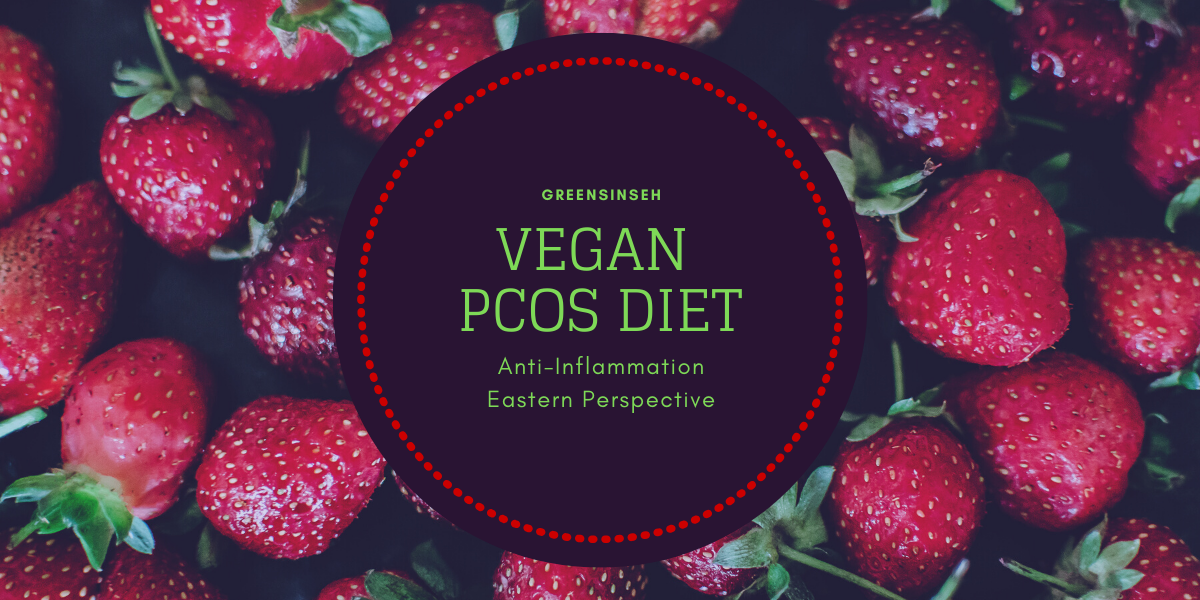What is a Vegan PCOS Diet?
For Polycystic ovary syndrome sufferers, a Vegan PCOS diet might be just the right diet for you.
PCOS is a condition caused by hormonal imbalance and has various symptoms such as increasing levels of androgen hormones, multiple cysts on ovaries, and insulin resistance. It is caused by non-cancerous cysts on ovaries. It will be challenging for women to lose weight with PCOS. [1]
A vegan diet is entirely based on products of non-animal origin. It does not include any animal products such as dairy, meat, and eggs. It is thought that a vegan diet is beneficial for health, and it can also fulfil the various ethical criteria’s and has no environmental concerns.[2]
A vegan diet is very important for PCOS in women and for weight loss as it focuses on fruits, grains, and vegetables and helps you to optimize overall health.[2]
And if you would like to find out more about PCOS and how I treat PCOS naturally with TCM herbs and acupuncture, you can click the image below to find out more. And I strongly recommend you to read that article first before scrolling down to read up more on how vegan diet can improve your PCOS for a holistic approach.
Before we go deep into PCOS Vegan diet, we have to understand what is insulin resistance and why is it so important.
What is Insulin Resistance?
Insulin is an important hormone produced and regulated by the endocrine system – the sophisticated network of hormonal signals that regulate crucial bodily functions. Insulin directs many metabolic activities such as fat storage and energy usage.
A healthy metabolism needs cells that respond readily to insulin, the hormone that facilitates the passing of blood glucose through the cell wall to be converted into energy. Insulin does more than just regulate glucose. It also regulates many body processes, with its main targets being muscle, liver, blood vessels, the pituitary gland, and the brain. Insulin can affect the expression and regulation of protein synthesis and DNA, as well as steroid hormone metabolism (including the sex hormones estrogen, progesterone, and testosterone).
When your cells become insulin resistant, they lose their ability to respond properly to insulin. One result of this is that large quantities of glucose cannot enter cells and remain instead in the blood stream where the glucose passes to the liver and is converted into fat. This process often leads to weight gain.
In some cases, hyperglycemia may lead to increased excretion of glucose in the urine and sometimes an initial weight loss. Excessive glucose in the blood stream also leads to free radical damage and to sugar-related damage to body tissues.
Another potential result of insulin resistance is hormonal imbalance like that seen in PCOS, specifically elevated androgen levels. Androgens are masculinizing hormones such as testosterone and DHEA. Insulin resistance initially leads to excessively high levels of insulin in the blood stream, as your body attempts to compensate.
Ultimately, though, there is insufficient insulin, which may result in a rise in blood sugar and the onset of type 2 diabetes, one of the potential long-term complications of PCOS.
Ongoing fatigue is often a side effect of cells being unable to convert enough glucose into energy.
The adverse impact of PCOS can be greatly reduced by reversing insulin resistance to improve the insulin sensitivity of cells. This can result in lowered glucose and insulin in the blood stream as well as reduced androgen levels, and therefore a reversal of PCOS symptoms. One result of reversed insulin resistance is often a huge improvement in a sense of well being in those with PCOS, including greater energy.
The greatest advantage a vegan diet has is its low glycemic index diet. Of course, it depends on how you prepare your meals. Things like white rice, refined sugar, white bread have to go and you have to replace it with wholegrains and wholesome foods.
Read on.
For those with a weight concern - take it slow
Many people with PCOS are not obese. In fact, as many as 50% of women with PCOS may not be overweight.
If you have lean PCOS, please note that the jury is still out on how much of a role insulin dysregulation plays. Some research shows that even those who are thin may have some problems with insulin regulation and insulin sensitivity. [3]
According to some studies, lean women with PCOS tend to have higher insulin levels in their blood than lean or normal-weight women without PCOS. [4]
For some women with PCOS, their ovaries are highly sensitive to the effects of insulin so that even if serum insulin is normal, the ovaries are over-reactive to that insulin and will have increased ovarian androgen output. [5]
For those women with PCOS who want to release weight, the human body generally works against that desire by trying to maintain its current weight. This is why, when people try sudden or extreme diets, they may release a great deal of weight quickly, but those pounds usually return.

Eating the right foods
These are the basic recommendations of the USDA’s New Food Guidelines for 2005.
Fruits and Vegetables
- Two cups of fruit and 2½ cups of vegetables per day are recommended for a reference 2,000-calorie intake, with higher or lower amounts depending on the calorie level.
- Choose a variety of fruits and vegetables each day. In particular, select from all five vegetable subgroups (dark green, orange, legumes, starchy vegetables and other vegetables) several times a week.
Grains
- Consume 3 or more ounce-equivalents of whole-grain products per day, with the rest of the recommended grains coming from enriched or whole-grain products. In general, at least half the grains should come from whole grains.
Fats
- Consume less than 10% of calories from saturated fatty acids and less than 300 mg/day of cholesterol, and keep trans-fatty acid consumption as low as possible.
- Keep total fat intake between 20%-35% of calories, with most fats coming from sources of polyunsaturated and monounsaturated fatty acids, such as nuts, and vegetable oils.
Carbohydrates
- Choose fiber-rich fruits, vegetables, and whole grains often.
- Choose and prepare foods and beverages with little added sugars.
Sodium and Potassium
- Consume less than 2,300 mg of sodium (approximately 1 teaspoon of salt) per day.
- Choose and prepare foods with little salt. At the same time, consume potassium-rich foods, such as fruits and vegetables.
What to look out for - carbs or calories?
Do carbohydrates cause you to become fat? It seems most people think so. Carbs have been blamed for causing excess weight, giving rise to such popular diets as Atkins and Sugar Busters. Let’s explore this issue to see what is going on.
There appears to be a preferred sequence for the use of nutrients that is determined by the body’s storage capacity and tissues’ need for specific fuels.
For example, alcohol has the highest priority for oxidation (burning for energy) because the body has no place to store it, and conversion of alcohol to fat is energetically expensive. The body prefers not to waste energy, unless it is absolutely necessary.
Carbohydrates and amino acids (the building blocks of protein) are next in line in the fuelburning hierarchy.
There are no storage depots for amino acids. Amino acids are used to build proteins that perform critical functions throughout your body. Other amino acids are distributed to the muscle cells as fuel, while still others are broken down into blood sugar (glucose) or stored as a special fuel molecule called glycogen. When needed, glycogen can be converted into blood sugar to provide fuel for the body.
Carbohydrates are broken down and used immediately as fuel or stored as glycogen (the storage form of blood sugar). However, glycogen storage capacity is limited. Once the glycogen depots are filled, carbohydrate will be converted into fat (your body has an unlimited ability to efficiently store dietary fat).
Your body will turn to burning stored fat only when there is insufficient carbohydrate and protein fuel conveniently available. But what happens if you drastically reduce your consumption of carbohydrates, the primary and preferred source of fuel for your body? Your body will turn to stored fat and start burning it.
In summary, carbohydrates are not stored as fat unless your total caloric intake consistently exceeds the total calories you are burning. So eating carbs per se is not what makes you fat. Eating too many total calories is what makes you gain weight. All you have to do is look at Third World countries where the primary food in the diet is a carbohydrate such as white rice or millet. If carbs made people fat, then people in poor countries would be the fattest people on earth. Instead, they are among the thinnest. They are thinner than Americans because their total caloric intake is much less and they are much more physically active. In short, their dietary caloric intake is balanced with calories expended for energy.
What the research says about low-carb diet
Penn State University recently conducted a study of 26 obese PCOS women who wanted to become pregnant.[6] They were put on a calorie-restricted diet for one month and divided into two groups. One group had a high-protein (moderate carb) diet, while the other group was put on a high-carb diet, low-protein diet. The percentage of fat was the same in each diet.
Both groups of women lost an equal amount of weight. Moreover, there was no difference between the two groups in androgen (male hormone) levels, measures of glucose metabolism, or leptin (a fat and reproductive hormone). The most striking result of the study was that both groups had a decline in androgens, better glucose tolerance, and improvements in leptin. Fourteen of the 26 resumed menstruation. The researchers report that the reduction in calories was the variable that caused the favorable outcome, since both the high-protein and high-carb diets had the same effect.
This study suggests that reduction of calories, not necessarily the reduction of carbohydrates, is a critical variable in losing weight, increasing fertility and reducing other PCOS symptoms.
I can’t emphasise enough that if you belong to above-acceptable weight category and are diagnosed with PCOS, losing weight is an integral part to treating your PCOS condition. I have patients who lose 7-10kg and get their periods back on track without any hormonal medications(eg clomid or letrozole) and some even went on to conceive.
Vegan PCOS Diet

So what should you eat in a vegan PCOS diet?
Before we even go into there, we have to be mindful of what we have to limit ourselves with.
- Refined carbs (white bread, pizza dough, regular pasta and white rice)
- Saturated and trans-fat (doughnuts, french fries, frozen pizza)
- Sugary drinks (that means your soda fruit juice, bottled smoothies, cold-pressed juices and bubble teas)
- Sugary processed foods (Cakes, candy, cookies, and other sweets, sweetened cereals, yogurts with added sugar and ice cream with excess added sugar or sugar substitutes
What we have to be eating more in a vegan PCOS diet?
Fibre
- Seeds (chia, flax, sunflower seeds)
- Legumes (black beans, lentils, chickpeas)
- Berries (raspberries, blackberries, blueberries)
- Whole Grains (bulgur, quinoa, brown rice, whole oats)
Protein
- Plant protein sources (beans, peas, tofu, tempeh)
Antioxidant-rich food
- Fruits (strawberries, blueberries, raspberries )
- Vegetables (spinach, artichokes, kale)
- Whole Grains (whole oats, whole wheat, quinoa, brown rice)
- Unsaturated fats (nuts like pecans, nut butters, olive oil, avocado)
Organic whole soy
- Miso
- Edamame
- Tempeh
Healthy Fats
- Olive oil
- Plain, unsalted nuts
- Avocado
BONUS - 3 recipes ideal for Vegan PCOS Diet
1. Blueberry green smoothie

Smoothies are always a great addition to your vegan PCOS diet. Recipe can be found here.
2. Chickpea Chat Masala

If you are on a vegan PCOS diet, chickpea is a great source of protein. Recipe can be found here.
3. Vegan Apple Broccoli Salad

Personally, a vegan PCOS diet can’t be complete without a great and healthy salad. Recipe can be found here.
Physical activity - how much?
Let’s not forget about exercise. Engaging in regular physical activity and reducing sedentary activities promotes health, psychological well-being and healthy body weight.
Here is some basic information that will help you determine what constitutes a healthy physical activity:
- Engage in at least 30 minutes of moderate-intensity physical activity, above usual activity, at work or home on most days of the week.
- For most people, greater health benefits can be obtained by engaging in physical activity of more vigorous intensity or longer duration.
- To help manage adult body weight and prevent gradual weight gain, engage in approximately 60 minutes of moderate to vigorous activity on most days of the week while consuming less calories than you need.
- To sustain weight loss in adulthood, participate in at least 60 to 90 minutes of daily moderate-intensity physical activity while not consuming more calories than you need. Some people may need to consult with a healthcare provider before participating in this level of activity.
Achieve physical fitness by including cardiovascular conditioning, stretching exercises for flexibility, and resistance exercises or calisthenics for muscle strength and endurance.

Conclusion
It is not easy dealing with PCOS as a vegan, therefore I commit my time to finding the latest research and delicious recipes to help women with PCOS.
Remember, if you have PCOS, it is TOTALLY POSSIBLE to get your periods back on track and even get pregnant. Don’t give yourself a death sentence by saying ‘I can’t get pregnant because I am diagnosed with PCOS’. You just need a little guidance and I am willing to help you if you have difficulties with your periods or fertility. You can always click on the button below for a consultation.
About the author

Edmund graduated with a First Class Hons in Biomedical Sciences and Traditional Chinese Medicine from Nanyang Technological University, before taking a Masters in Gynaecology(TCM) in Liaoning, China.
He has successfully treated patients with unexplained infertility, polycystic ovarian syndrome(PCOS) and endometriosis and helped them conceive naturally with Traditional Chinese Medicine.
References
[1] Are plant based diets good for pcos? Martha McKittrick Nutrition. https://www.marthamckittricknutrition.com/are-plant-based-diets-good-for-pcos/. Published May 1, 2019. Accessed February 15, 2020.
[2] Dresden D. PCOS diet: Foods to eat and avoid. Medical News Today. https://www.medicalnewstoday.com/articles/323002#how-does-diet-affect-pcos. Published September 6, 2018. Accessed February 15, 2020.
[3] Diamanti-Kandarakis E. Insulin resistance in PCOS. Endocrine 2006 Aug;30(1):13-17. Morales AJ, et al. Insulin, somatotropic, and luteinizing hormone axes in lean and obese women with polycystic ovary syndrome: common and distinct features. J Clin Endocrinol Metab 1996 Aug;81(8):28542864. Orbetzova MM, et al. Metabolic disturbances in women with polycystic ovary syndrome. Folia med (Plovdiv) 2003;45(3):12-20.
[4] Vrbikova J, et al. Insulin sensitivity and beta cell function in women with polycystic ovary syndrome. Diabetes Care. 2002;25:1217-1222. Vrbikova J, et al. Insulin sensitivity in women with polycystic ovary syndrome. Journal of Clinical Endocrinology & Metabolism 2004;89(6):2942-2945.
[5] Ben-Shlomo I, et al. Hyperandrogenic ovulation (the polycystic ovary syndrome) – back to the ovary? Human Reproduction Update 1998;4(3)296-300.
[6] Stamets K et al, A randomized trial of the effects of two types of short-term hypocaloric diets on weight loss in women with polycystic ovary syndrome, Fertil Steril. 2004 Mar;81(3):630-7


